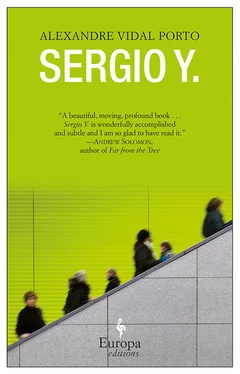A blonde girl with a serpentine tattoo around her wrist handed me a course brochure. It recommended students start with a basic cooking course and then complement that with electives.
Sergio had to have completed three mandatory courses in that catalog. One would almost certainly have been a culinary fundamentals course to learn general cooking techniques and food handling. I had no way of knowing what the others were. If I had only known the cuisine at the restaurant he had come close to opening, I would have been able to deduce. But it was impossible to conjecture blindly.
The distance I had walked and the disappointment at not being able to find out everything I had wanted about Sergio Y. for the first time on this trip made me feel somewhat defeated.
I came to the realization that not only was he dead, but that his stay in this city had left almost no traces. His presence was fading. The city was forgetting him. In New York, Sergio Y. barely existed anymore.
Mariana scheduled a dinner with her friends that evening. I thought I would offer to accompany her, but the group was big and I would be the only parent. I decided instead to order a sandwich and a bottle of wine in my room and go to bed early. However, after drinking two-thirds of the bottle, my mood improved and I was full of energy. I went for a walk.
I walked north along Fifth Avenue, with Central Park to my left. With the fresh park air blowing on my face, I had a surge of confidence. At that moment, I felt I could still live a well-adjusted life. I would resolve my conflicted feelings toward Sergio Y., I would return to Brazil and continue to be a good analyst and a good person. I would avoid anything that would cause harm to others. Mariana would be happy forever. They would discover the cure for cancer. No one would ever die.
At around 72nd Street, part of the wine had already been processed by my body, and my euphoria began to give way to fatigue. I walked another three blocks before deciding to go back.
In my hotel room, I again had the desire to breathe a bit of fresh air. But the window had a safety lock, and I could only crack it open about five centimeters; it was not enough to let the air in, just to fill the whole room with the city’s muffled noises.
Before going to bed, I lay my head on the sheets and allowed myself to get lost in my rumination (“A rich doctor’s daughter is more likely than the majority of the population to graduate from a good American university, right? If I were black, and my great-grandfather had been a slave, in what kind of bed would I be sleeping now? What kind of work would I be doing? Would my daughter be studying at Columbia? But why think about it? Things are what they are. One’s wealth or lack thereof is a matter of chance. So many people start off well in life and do not end up well. I think my daughter has taken control of her own life. I don’t even need to support her anymore. She’s not given to extravagance. Her boyfriend is in Chicago with his father, who has terminal cancer. I met him last year in São Paulo. The boyfriend has also managed to land a job. Soon, she’ll be married, and my mission as a single father will have been fulfilled… ”).
I woke up at 6 A.M. Partly because I was still on Brazil time but mainly because of my anxiety over Mariana’s graduation and my approaching meeting with Dr. Coutts.
I wore a blazer, a dress shirt, a necktie and new shoes. Before leaving, I looked in the mirror and thought I looked elegant. Once again, it was sunny but not too hot. By eleven, I had arrived on campus. I sat on one of the green metal folding chairs that had been set up on the lawn in front of the stage waiting for a call from Mariana so that we could make arrangements to find each other in the crowd.
I finally found my daughter in her black gown, with her blue sash around her waist and a small green and yellow ribbon pinned to her chest. She gave me a hug and a kiss, said she would call my cell phone so we could arrange to meet after the ceremony and then disappeared into a throng of her classmates.
I liked the speeches and enjoyed being surrounded by people full of optimism and dreams about the future. After the ceremony, I accompanied Mariana to her dorm room so she could change, and from there we would go to lunch.
She wanted to go to an Italian restaurant named Gino’s. It was far from campus and didn’t accept credit cards. If it had been up to me, I would have gone somewhere closer. But because she had expressed a desire to go there, and since I wanted to please her, we went to Gino’s. I knew why she had chosen this particular restaurant.
Neither of us remembered the exact location on Lexington Avenue. We got out of the cab two blocks too soon and walked down the right side of the avenue until we found the restaurant’s dark green door.
A notice was pasted on top of a padlock informing us that the restaurant had closed its doors at the end of April.
(“Out of business” was what the notice read. Afterwards, I learned that they had failed to renew their lease, and the owner, who had had enough, decided to give up and retire.)
“Imagine, it had been here since 1945. It was almost as old as I am,” I said to Mariana.
“It was Mom’s favorite, remember?”
“Yes, I remember,” I said solemnly.
“Where should we go now?”
We went to a restaurant on the eighth floor of a nearby department store. I liked my main dish (spaghetti alla carbonara) and the dessert (tiramisu). After lunch, I convinced Mariana to let me buy her some clothes, and this did me good.
We said good-bye in the late afternoon. She agreed with me that I had no business being at her “prom.” She returned to her dorm and I to my hotel. It looked like it might rain so I took a taxi.
I went to bed early. I fell asleep filled with a sense of pride. The next day I would feel ashamed, but, on the other hand, I would manage to learn more about Sergio Y.’s life and my real involvement in his death.
I woke up very early. Before leaving the hotel, I looked up Cecilia Coutts’s address on the Internet so I could find it on my map. To my surprise, I realized the townhouse she worked out of was on the same block as Sergio Y.’s. The restaurant he would open was also very near Grove Street. The cooking school was a subway station away. Apparently, Sergio wanted his life to be concentrated in this neighborhood.
But why an apartment in the West Village? I came up with several explanations, but I think all of them underestimated Sergio’s motives, which were anything but obvious. I speculated on his reasons nonetheless. One could be the fact that the apartment where Sergio lived belonged to his family. Oliver Hoskings informed me a Brazilian company was listed as the owner of 12 Grove Street, owned by Salomão, I imagine. Staying at a townhouse belonging to his family would have been much easier than renting an apartment on his own.
Confused, I thought of the neighborhood’s history as the birthplace of the gay rights movement. But Sergio had already given me plenty of proof that he was nothing if not a pragmatist. His choice would have been based primarily on practical reasons. Some of the most beautiful streets in Manhattan were in this neighborhood. His doctor’s office was there, too. It was also close to his cooking school. It was a good place to open a small restaurant. It was perfectly understandable that he would want to live there. I myself would love to live there.
The West Village had a tradition of counterculture and projected a bohemian aura, but it was also a neighborhood for the rich. Not just anyone could afford to live here. One needed money. The best houses, such as the one Sergio lived in, belonged to famous artists and lawyers and Wall Street bankers. Therefore, the only clear signal conveyed by Sergio Y.’s address was that he was still surrounded by the class from which he came.
Читать дальше












